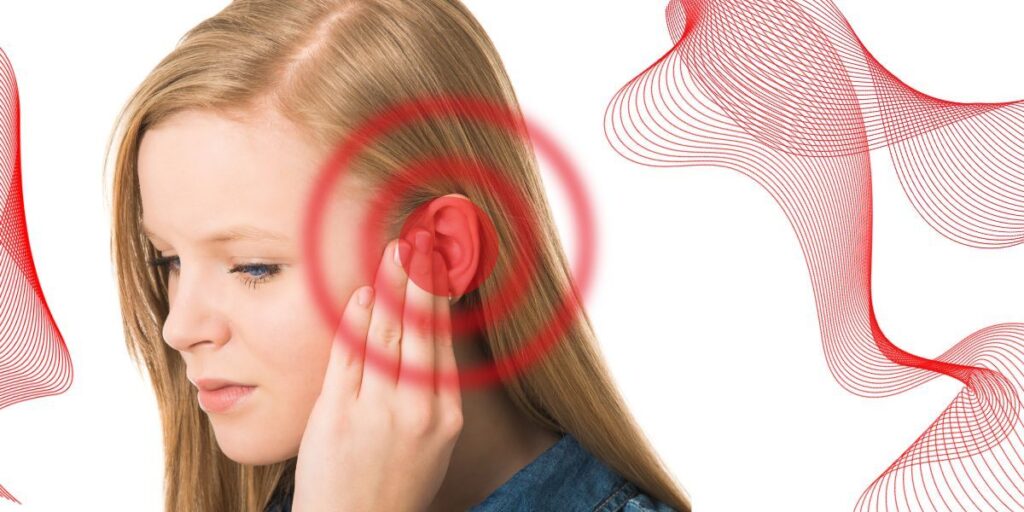So, tinnitus. I decided to write this blog about tinnitus because I still find it hard to fathom that I didn’t ‘discover’ I had tinnitus until my late 30’s – despite having it my entire life!
I knew no different. It was normal. How would I explain to anyone what ‘it’ was, if I didn’t know it wasn’t normal? As a child, how would you describe a variable sound that’s in your own head? I would now say that I have moderate tinnitus. It’s tempting to call it mild tinnitus instead. Just because having always lived with it, I’ve never known any different. My brain is trained to somewhat drown it out.
But when I do think about it, when I take a moment to be conscious of it, it’s always there.
Tinnitus is a condition characterised by the perception of sound even though there is no external sound present.
Tinnitus can be intermittent or constant, and it can also vary in intensity. People experiencing tinnitus might ask themselves ‘Why are my ears ringing’ or ‘What is that constant buzzing sound in my head?’. People also experience tinnitus without hearing loss.
What does Tinnitus Sound Like?
A tinnitus sound is different to everyone experiencing it. Another reason why, as a child it would be very difficult to articulate. So my tinnitus went undiagnosed during my hearing tests for most of my life and I got used to life without tinnitus remedies.
The types of tinnitus sounds are varied and might include ringing, buzzing, hissing, drilling. They may be present all the time, or they may be louder at different times of the day.
Does Tinnitus Go Away?
Often after exposure to loud noise, or perhaps after a heavy cold or illness, people can experience tinnitus but it goes away on its own after a while. However, for many people tinnitus has no apparent cause and doesn’t go away.
It’s a common problem that affects millions of people around the world, and it can have a significant impact on quality of life.
Here are some points on Tinnitus:
- Tinnitus sounds different to different people!
- Tinnitus is estimated to affect about 10-15% of the general population.
- It is more common in older adults, with the prevalence increasing with age.
- Men are more likely to experience tinnitus than women.
- The most common tinnitus causes include exposure to loud noise, aging, and ear wax build-up but other causes can also include the use of certain medications and other medical conditions such as high blood pressure, diabetes, and Menieres disease.
- Tinnitus can have a significant impact on quality of life, including sleep problems, difficulty concentrating, tinnitus anxiety or depression.
- Tinnitus is not a disease, but rather a symptom of an underlying condition. It can be treated with a variety of approaches, including hearing aids, sound therapy, and medication.
- Research is ongoing to better understand the causes of tinnitus and to develop new tinnitus treatments.
What can I do about Tinnitus? Can I get rid of Tinnitus?
If you’re experiencing this, it is important to talk to a healthcare professional about your tinnitus symptoms and treatment options. While tinnitus can be a frustrating and distressing condition, there are steps you can take to manage tinnitus and improve your quality of life.
If you have been diagnosed with tinnitus you may also require a hearing test. They will provide you with an audiogram. If there is hearing loss, wearing hearing aids can sometimes assist with hearing as well as alleviate some tinnitus symptoms. Tinnitus and hearing loss often go together.
If there is no hearing loss, there are other devices such as tinnitus maskers, similar to hearing aids, which can provide external sounds to help distract the brain from the tinnitus. Tinnitus masking may involve using sounds such as white noise / static.
In rare cases tinnitus can appear to be pulsing in ear or ‘throb’ in line with the heartbeat. This is called pulsatile tinnitus. It sounds like the heartbeart in ear. Another rare type of tinnitus is ‘musical tinnitus’ as known as musical hallucinations, where you may hear sounds like music or songs. It is important in these cases that you seek the advice of your GP or medical professional as soon as possible.
Whilst there is currently no tinnitus cure, there are a great number of studies around it and perhaps the future will provide one when there are more answers.
If you have been diagnosed with tinnitus, consider different treatments to help with daily life. Make a note of when it might be better or worse and why that might be – time of day, medication, lack of sleep, stress etc. Some lifestyle changes may be able to help such as breathing techniques, practicing with tinnitus and mindfulness, and making sure you are getting good quality sleep.
Tinnitus Support
Many people find sharing their experience a big help, both for tinnitus support and for sharing ways of dealing with it day to day. In the deaf club network, Deaf Dynamics, our community has people who are living with tinnitus. Sharing life experiences can be very beneficial in coming to terms with tinnitus and living with it day to day. Join us and share your experience!





